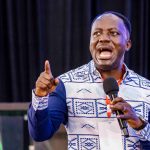Throughout history, leaders have relied on their wisdom and strength to achieve their goals. Combining experience and fresh perspectives has proven to be a powerful tool for successful leadership. Youth bring strength, energy, creativity, and a willingness to take risks, while the elderly offer wisdom, counsel, guidance, and a deep understanding of the world.
Leadership is the ability to combine strength and wisdom to achieve desired results. Strength is the capacity or willingness to withstand great force or pressure through zeal or passion, while wisdom is the quality of having experience, knowledge, guidance, and counsel. From a clear perspective, the strength of youth brings energy, passion, and innovation to leadership. Young leaders are often bold, creative, and unafraid to take risks, which are essential qualities for success in today’s fast-paced, rapidly changing world. Together, they form a formidable team that can overcome even the most daunting challenges.
As written in the book of Ecclesiastes, “Remember your Creator in the days of your youth, before the days of trouble come and the years approach when you will say, ‘I find no pleasure in them'” (Ecclesiastes 12:1). This verse emphasises the importance of utilising the strength of youth while acknowledging the fleeting nature of time. It is crucial to invest in the younger generation and empower them to lead, as they will be the ones to carry the torch forward. Youths are people with passion and a readiness to take action. The challenge lies in whether we will use their strength to benefit the church or the world. However, the value of the elderly should not be underestimated.
As stated in Proverbs, “Gray hair is a crown of splendour; it is attained in the way of righteousness” (Proverbs 16:31). This highlights the honour and respect that should be given to those who have lived long and fruitful lives. Their experiences, knowledge, and wisdom are invaluable assets that can guide and mentor the younger generation. The strength of youth needs nurturing and coaching for maximum impact.
For this reason, leadership is a critical aspect of any organisation, whether it is a business, non-profit, or religious institution. Great leaders possess unique qualities, including strength, wisdom, and vision. Proverbs 20:29 states, “The glory of young men is their strength, but the splendour of old men is their grey hair.” From this scripture, the question arises about who makes the best leaders. Is it the young, with their energy and fresh ideas, or the old, with their experience and wisdom? The answer is simple: the strength of the youth and the wisdom of the elderly are great tools for successful leadership.
Young people are valuable assets in any organisation. They bring fresh perspectives, innovative ideas, and boundless energy to the table. In the Bible, youth are often recognised as a source of strength and vitality. Ecclesiastes 11:9 also says, “Rejoice, young man, during your childhood, and let your heart be pleasant during the days of young manhood. And follow the impulses of your heart and the desires of your eyes. Yet know that God will judge you for all these things.” This verse acknowledges the youthful exuberance and encourages young people to pursue their passions while recognising the need for accountability.
The Church of Pentecost recognises the strength of youth in leadership. The operational structure of the church encourages young people to take up leadership roles and responsibilities within the church and society. The church believes that young people can make a positive impact and contribute to the growth and development of their communities. In doing so, they become good leaders as they grow older, gaining experience and appreciating what the youth bring to the table when they are involved in leadership.
Additionally, the Bible teaches that young leaders can inspire others. 1 Timothy 4:12 says, “Don’t let anyone look down on you because you are young, but set an example for the believers in speech, in conduct, in love, in faith, and in purity.” This verse encourages young leaders to set a positive example for others and to demonstrate their leadership potential.
Furthermore, the Bible teaches that older leaders can be excellent mentors. Titus 2:2-3 reads, “Older men are to be sober-minded, dignified, self-controlled, sound in faith, in love, and in steadfastness. Older women, likewise, are to be reverent in behaviour, not slanderers or slaves to much wine. They are to teach what is good.” This verse highlights the importance of older leaders in mentoring and teaching younger leaders. Effective leadership requires a balance of the strength of youth and the wisdom of the elderly. Young leaders bring fresh ideas, boundless energy, and inspiration, while older leaders bring experience, wisdom, and mentorship. Combining these two elements creates a powerful leadership dynamic that can guide organisations to success.
In conclusion, successful leadership requires both the strength of youth and the wisdom of the elderly. The Bible teaches that both the young and old have unique qualities to offer in leadership. Young leaders bring enthusiasm, creativity, and innovation, while older leaders bring experience, wisdom, and mentorship. By working together, they can create a powerful leadership dynamic that can guide organisations to success. As Psalm 71:18 says, “Even when I am old and grey, do not forsake me, my God, till I declare your power to the next generation, your mighty acts to all who are to come.” Both age groups have their unique strengths and contributions to make, and it is essential to recognise and harness them. As Ecclesiastes 4:9-12 says, “Two are better than one because they have a good return for their labour. If either of them falls, one can help the other up. But pity anyone who falls and has no one to help them up. Also, if two lie down together, they will keep warm. But how can one keep warm alone?” Let us embrace the strength of the youth and the wisdom of the elderly in leadership and work together towards a better future. If we truly aim to bridge the generational gap in leadership, we need to blend the young and the old in leadership, utilising the strength of the youth while imparting the lessons learned through experience.
Written by P/Overseer Enoch Okain





